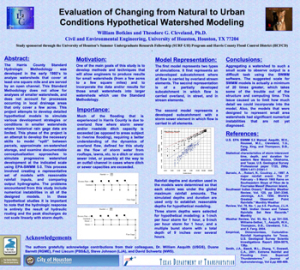The Cullen College of Engineering was well represented at the University of Houston’s third-annual Undergraduate Research Day. Of the more than sixty students giving oral presentations or showcasing posters outlining their research, eleven were mentored by engineering faculty members.
Sponsored by the university’s Office of Undergraduate Research, the event featured the work of undergraduate students who conducted original, substantive research projects under the guidance of a UH faculty member within the past year. A majority of these students conducted research as part of the university’s Summer Undergraduate Research Fellowship program, which provided them with a $2,800 stipend for 10 weeks of research over this past summer.
Among the engineering students who presented at the event was William Botkins, a senior civil and environmental engineering major who conducted research under Ted Cleveland, associate professor of environmental engineering.
Over the summer, the pair attempted to model small watersheds—typically less than one-square-mile—with a widely used program for watershed hydraulic modeling, SWWM. Municipalities are increasingly asking for such small-scale models before the construction of new commercial and residential developments, since such projects could cause flooding and other drainage problems in surrounding areas.
According to Botkins, SWWM yielded results with significant “fuzziness” as well as stability issues (results that are shared by other users of the program across the country), suggesting that researchers’ current understanding of the program is not yet suitable for modeling very small watersheds. Cleveland and Botkins therefore undertook efforts to adjust model elements to simulate the behavior of very small watersheds should produce approaches that are valuable not only locally, but throughout the modeling community.
Despite a conclusion that Botkins described as “frustrating,” the research experience, he said, helped him choose to pursue a graduate-level degree, while letting him gain a better grasp of his field.
“The project allowed for a lot more one-on-one time,” said Botkins. “Dr. Cleveland was really able to get down to the details of what we were doing and what was going on with our research.”
